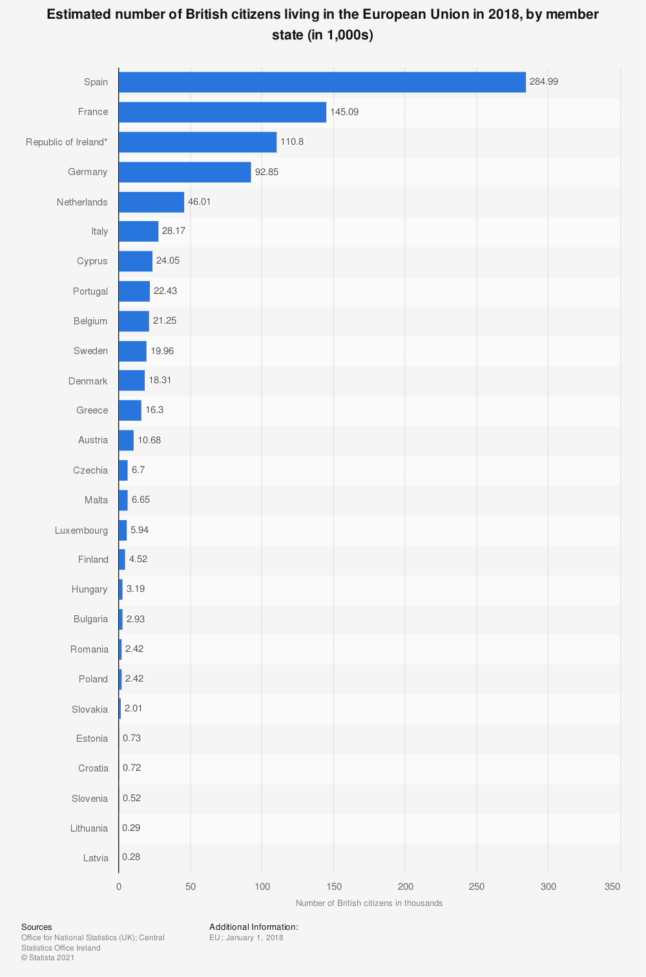QUESTION: Recent articles in the UK media describe growing pressure in Spain to extend or scrap the 90 day rule for British nationals because it is hurting Spanish tourism. Is there any chance we will see this being considered in Italy?
When Britain left the EU, British citizens lost the right to freedom of movement within the bloc – and the new 90-day limit has been a particular problem for those with second homes in European countries.
The change has hit some parts of Europe hard, too: including the region of Valencia in Spain, which is now campaigning for UK nationals to not have their time on Spain’s Costa Blanca limited or determined by the 90-day Schengen rules that now apply to them.
This is because the impact of Brexit on freedom of movement is affecting one of the Valencian economy’s driving forces: UK nationals who spend extended periods of time in Spain.
READ ALSO: How Brits can properly plan their 90 out of 180 days in Italy and the Schengen zone
Regional authorities have called on Spain’s Tourism Ministry to help make it easier for British nationals to spend more than 90 out of 180 days in the Valencia region without having to apply for a visa.
For anyone who is not an EU citizen – including UK nationals since January 1st 2021 – the 90-day rule comes into play. You can find a full explanation of how it works here, but essentially it limits trips into the Schengen zone to 90 days out of every 180. These rules apply equally across the bloc.

UK nationals who don’t hold an Italian or EU residency document following Brexit are now wondering if the Italian authorities might look at changing the rules.
But so far, there are no reports than any regional authorities in Italy have put pressure on the government to give British nationals an exemption to the post-Brexit rules.
READ ALSO: Where do all the Brits live in Italy and how ‘Italian’ are they?
Tourism figures appear to offer an explanation for the fact that Spain is the first place to see this push for a change.
UK tourism is worth far more to Spain than to Italy – and Spain is also more reliant on tourism overall.
Before the pandemic sent numbers tumbling across the board, figures for 2019 showed that Spain was the second most visited country in the world, coming just behind France. Italy ranked fifth.
Although tourism is important to Italy’s economy, the country counts almost 20 million fewer annual visitors than Spain – and the largest share of tourism to Italy (14.1 percent) comes from Germany, Italian government figures show, followed by the US. The UK accounts for about three percent of all tourism to Italy.
With UK visitor numbers being lower, they have less economic significance to the country.
There are also far fewer British nationals living in Italy than Spain. The most recent demographic data for UK nationals living in the EU revealed that more Brits live in Spain than any other member state.
Italy, on the other hand, ranked sixth with almost 260,000 fewer UK nationals living in Italy compared to Spain.

Is there any way Brits can stay in Italy for longer?
Many British people who have a second home in Italy have contacted The Local to ask how they could spend four or five months in a row here as they used to.
But with the 90-day rule in place and no sign of this changing soon, the only way for non-residents to spend more time in Italy is now to get a long-stay visa.
At the moment, if you plan to stay longer, most people from outside the EU would need to apply for a visa and residency permit (permesso di soggiorno).
READ ALSO:
- Can Brits stay more than 90 days in the EU if they have a European spouse?
- Can second-home owners get an Italian residence permit?
- Brexit: What can Italy’s British residents do about passport stamps?
While some countries such as France have made special residency permit provisions for second home owners, and certain other EU member states have so-called ‘Golden Visa’ schemes available to those who can afford them, Italy has no such process.
There has been widespread confusion about this for British nationals, but the post-Brexit immigration rules remain the same whether you own a property in Italy or not.
You’ll need to consider whether getting residency, in order to spend longer periods in Italy, is right for you.
Aside from the visa process, this involves paying income tax in Italy and other considerations which mean many people are opting to continue to follow the 90-day rule.
For more details about the process of applying for an Italian visa and residency permit, see the Italian Interior Ministry’s website or the EU immigration portal.
See The Local’s Brexit section for more details and updates.



 Please whitelist us to continue reading.
Please whitelist us to continue reading.
While I thank you for the view concerning the attitude of the different European states on the 90 day rule. I am bewildered by the talk of Spain and France making independent decisions regarding an EU piece of legislation.
Surely Europe states must all agree to change the rules not individual countries as chaos would rule over the policing of this differential
Of course I love my chosen and owned home in Italy. but the issue of a visa is not as straight forward as may be suggested, as the Embassies use an agency to filter and guide the process of application and to my cost the agency in the UK has demonstrated little grasp of the process and zero guidance
I don’t see why Italy would choose such an option, especially given the small numbers involved. And then there’s the fact we made the decision to acquire residency here (a somewhat fraught process!), and don’t see why those who haven’t should be ‘gifted’ an extension…